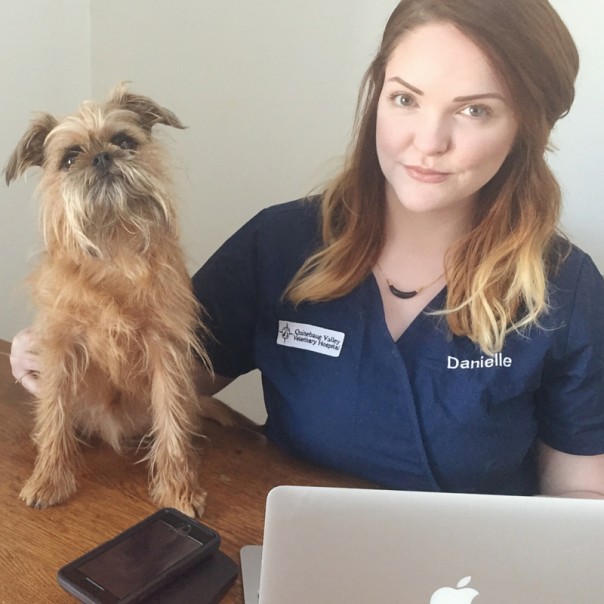Vet Tech Week is a time to acknowledge and show that you appreciate us. We don’t always need pizza or fancy gifts to make us feel like we are appreciated. Sometimes just acknowledging the work we do and that we are part of what makes your clinic great is enough. We want to feel valued and there is no dollar sign attached to that.
1. Teach Us Something
One of the best parts of working in this field is the ability to learn something new daily! For many of us, we have been through schooling but we truly don’t want our education to be over. We want to learn from our veterinarians and we look up to you. In between booked appointments and returning client phone calls, doctors don’t have much time to share their vast knowledge. Please make the time even if it is only for a few minutes. Discuss a complicated disease process with us. Tell us how a medication affects the body. Show us a cool veterinary journal or an interesting slide on the microscope. We will listen! We want to learn and we look to you to teach us.
2. Promote Us To Your Clients
A lot of times clients and the general public don’t understand what a veterinary technician’s job entails. Tell them! We are a team that functions as a unit to provide quality care to patients and clients. Technicians are collecting and running lab samples, monitoring anesthesia and providing quality nursing care to severely ill patients. We are taking radiographs, filling prescriptions, and doing dental procedures. On occasion it can feel like we are just doing job duties and clients don’t have the opportunity to see how hard we work for them. We count on you to help educate the public on how hard we work for them and you! Tell clients who we are and what we do.
3. Say Thank You
Whether you say it out loud or write a quick “thank you” note, it means the world to us. We are people pleasers at heart and sometimes just hearing you say “thank you” can turn the crappiest of days around. You may know techs that have collections of unusual things. Some of us have collections of teeth, bladder stones, or other veterinary oddities. (Is it just me?) We like to save things. I personally have a collection of birthday cards, work anniversary cards and nice notes from doctors in the clinic. On bad days, I look at those to know that you guys care. As technicians we took an unspoken oath to protect you from vicious Chihuahuas, ferocious felines and overbearing clients. It’s our duty but it is always wonderful to hear “thank you.”
4. Listen To Us
How many of you know your techs pets by name? Do you know if they have a family or what they do when they are not in the clinic? How long have they been a tech? By no means am I saying work should be a social event where we discuss our weekend at the bar, but knowing who your techs are outside of in the clinic can key into what they find important. It can make us feel important. Also if we come to you with a concern with a patient, please don’t dismiss us. One of the ways to keep anyone happy is to make them feel like what they are saying is being heard.
5. Empower Us
None of us want to feel like just another cog in the wheel. We all want to feel like what we do every day matters. Encourage us to discuss a new protocol or medication. Ask us our input on an involved case. When techs feel like they have input on the medicine we practice and the clinic we work at, we feel like we matter. What we are suggesting may work well for the clinic. Maybe it won’t. We should always encourage each other to improve patient care and the growth of the clinic.
If you even do a couple of these small things, not just on vet tech week, many of us will continue to work happily for you. We will jump in front of the anal gland expression gone wrong for you. We will take a message from a client when we know you are 20 minutes behind on appointments. We will happily retake that radiograph for you for the third time. Above all we will continue to look up to you and trust you.
 2. a woman regarded as temperamental or haughty who demands that attention be paid to her needs, especially without regard to anyone else’s needs or feelings.
2. a woman regarded as temperamental or haughty who demands that attention be paid to her needs, especially without regard to anyone else’s needs or feelings.
 We should also agree that there are some situations where quitting is the best option by far. There is no honor in sacrificing yourself in an unwinnable situation. Martyrdom is not a stepping-stone on the path to career success. If you are in a terrible work environment, there is NO shame in leaving. Be smart and professional about it: do your absolute best to avoid burning bridges, and know where you are going when you leave.
We should also agree that there are some situations where quitting is the best option by far. There is no honor in sacrificing yourself in an unwinnable situation. Martyrdom is not a stepping-stone on the path to career success. If you are in a terrible work environment, there is NO shame in leaving. Be smart and professional about it: do your absolute best to avoid burning bridges, and know where you are going when you leave.





